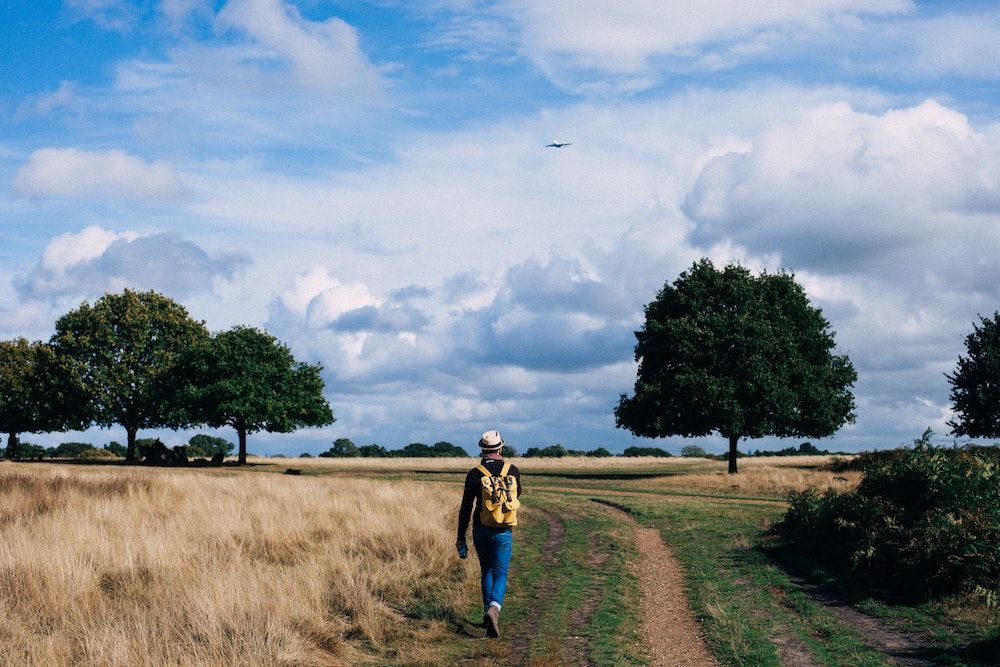According to a 2019 study, spending at least 120 minutes a week in nature is associated with good health and wellbeing. So, we’re rounding up some of the most joyful and unusual ways to pass the time outdoors
“Nature is fuel for the soul,” Richard Ryan, professor of psychology at the University of Rochester, said.
In Professor Ryan’s study, published in the Journal of Environmental Psychology, 537 college students were split into five separate experiments. In one, the students were taken on a 15-minute walk either through indoor hallways or along a tree-lined riverside path. In another, they looked at photos of buildings or landscapes. And in the last, they were asked to imagine themselves in active and sedentary situations, both inside and outside, and with others and without.
When the results of the study were in, the students reported that their energy and vitality levels were lifted by being outside, or even just from imagining that they were, and the researchers came to a conclusion: that being in nature makes people feel more alive.
And to get more specific, a separate study, published in Scientific Reports, revealed that 120 minutes per week is the optimal amount of time to spend in nature if you’re looking to improve your health and wellbeing. So, all there’s left to do now is to decide what to do with the time you’re given – and we have some ideas…

Add a quick two-step into your walk
Walking and dancing: two things that have been shown time and time again to improve our mood and our wellbeing. But add them both together? Now you’re talking. A 2012 study published in the Journal of Experimental Psychology: General found that walkers who moved fluidly, and waved their arms in a sort of improvised dance, generated more ideas than those who walked normally. Breaking out of our usual patterns of behaviour is shown to help us think more creatively, making this a great tool for blowing away brain fog. It doesn’t have to be a full-on moonwalk – a hop, skip, or spin here and there, or even just moving your arms rhythmically could do the trick. Not brave enough to go at it alone? Bring a friend along, or the whole family, and you’ll soon leave any self-conscious feelings behind.
Feel the ground beneath your feet
Here’s a fact you might not have been expecting to read: feet have nearly twice as many nerve endings as penises (more than 7,000 in each foot, compared to 4,000, in case you were wondering). For this reason, feeling the ground beneath your bare feet invites intense and fascinating sensations. Soft soil and dewy grass, warm, cool, tickly, smooth – there is so much to experience. And all these experiences come together to ground us in the moment, forcing us to connect with the environment and the body that we’re in.
Find and create natural aromatherapy spots
Aromatherapy uses plant extracts and essential oils for a number of wellbeing purposes. Certain scents might soothe anxiety, others might help boost your energy levels or clear your mind. You can, of course, buy aromatherapy oils in bottles, but you can also go and find these evocative scents out in nature. Look for big, bushy lavender plants, sprawling mint, and perfect roses. And if you’re looking to put your green fingers to use by introducing some wellness into your garden, patio, balcony, or windowsill, look into the plant qualities associated with different scents, and create your own sensory space.
Get out in the rain
One thing that’ll often dampen your enthusiasm for getting outdoors is bad weather, but there are some good reasons why you shouldn’t let a bit of rain spoil your plans. Firstly, when you go out for rainy walks you’ll likely be breathing in cleaner air. A 2015 study published in the Journal Atmospheric Chemistry and Physics found that rain droplets attract air pollution particles, cleaning up the air around you.

Speaking of what’s in the air – are you a petrichor connoisseur? Petrichor is the ‘smell of rain’ people often talk about picking up on. It’s that rich, sweet, fresh scent that is created when compounds from plant oils in the soil mix with the rain, and are released into the air. The scent is hailed as a mood booster – you can even buy candles that try to mimic its smell, but there’s no replacement for the real thing, so grab your raincoat and head on out.
Make a meal of it
Picnics are thought to have gained in popularity among the 18th century French aristocracy and they spread around the globe after the French revolution. Back then, picnics were associated with intellectual refinement – but, luckily, these days the pressure’s off to be the quickest wit on the blanket. A study from Warburtons, in celebration of national picnic week, traced how the contents of our picnic baskets have evolved over the past 10 decades, starting with traditional cuts of meat and chilled soufflé to hummus, quinoa, and even sushi. Of course, packing your favourite food and heading off to a beautiful vantage point is all you really need to reap the benefits of this outdoor pursuit, but if you want to take things up a notch, consider packing foods that are known to boost brain function, such as leafy greens, oily fish, nuts, and berries.
Bring a friend along
In Illinois, USA, Frances Kuo, co-founder of the Human-Environment Research Laboratory uncovered a link between proximity to nature and lower crime rates and a lower rate of general aggression. Digging a bit deeper, Frances found that it wasn’t purely the presence of trees that was having this effect, but that living in a place with more trees created environments where neighbours spent more time hanging out outdoors, talking to each other, and connecting. You might not be about to commit a crime, but there are still benefits to be drawn from taking time to connect with neighbours and those in your community while you’re out and about. These small connections can soon begin to flourish, and what may have started as a friendly wave hello, could lead to a regular walking partner in no time.
1. Put out feed and watch the birds
2. Offer to do gardening for an elderly neighbour
3. Visit an ancient forest and look up
4. Learn how to forage
5. Find a hill and fly a kite
6. Follow a breathing exercise in the fresh air
7. Try an outdoor workout
8. Write and post a letter
9. Create window boxes and hanging baskets to display outside
10. Go on a litter-picking walk
11. Visit a park
12. Walk instead of driving where possible
13. Dip your toes in a clean, safe stream
14. Try cloud-watching
15. Pull-on some welly boots and go for a muddy walk
16. Buy a plant identification book, and see what you can find
17. Visit somewhere meaningful to you
18. Do a yoga routine outdoors
19. Track down street art
20. Host a scavenger hunt
21. Eat your breakfast outside
22. Make a bug hotel
23. Go for a bike ride
24. Sketch what you can see
25. Read your favourite magazine outside (Happiful!)


Comments